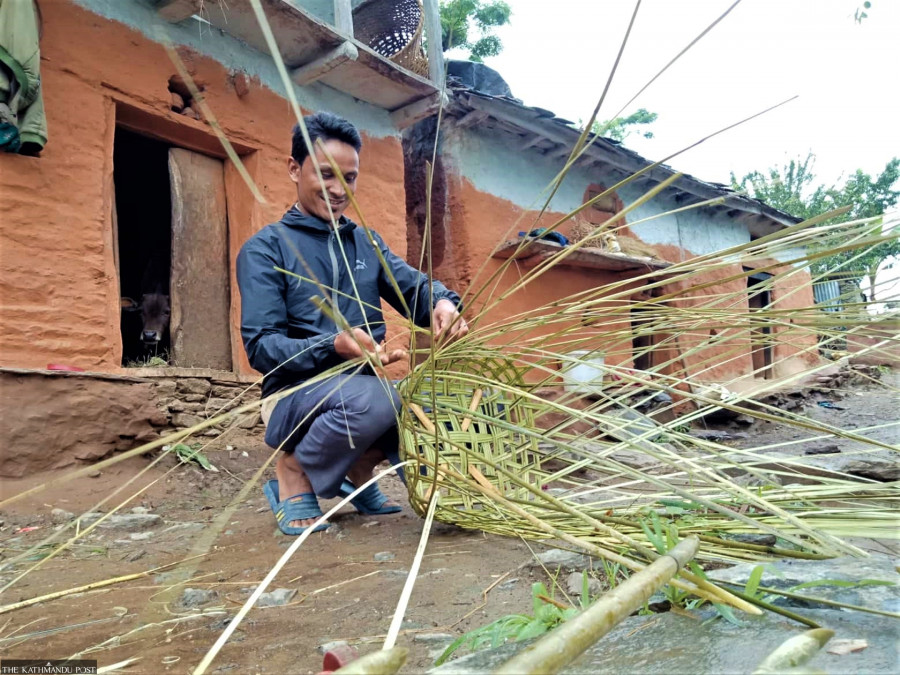
Weavers in Thadadhunga village of Bajhang for generations have been using Himalayan bamboo grown inside the national park. Basanta Pratap Singh/TKP
Piru Parki of Thadadhunga in Thalara Rural Municipality-5 is skilled at weaving Himalayan bamboo into everyday household items such as baskets, storage units, cups and plates used in traditional Nepali homes.
But the 72-year-old man is worried about the future of his beloved craft. He has passed on his skills to the younger generation of his community who are keen to keep the traditional craft alive but their keenness is subject to the availability of Himalayan bamboo.
With the local elections around the corner, several party figures have been coming to Thadadhunga to seek votes. Piru has been vocal about his demand—to make Himalayan bamboo available to the weaver community.
Thadadhunga, abuting Khaptad National Park, is a village inhabited by Parki and Sarki communities. Around 30 Parki and eight Sarki families make up the population of this village where almost every individual is a weaver. The craft has been passed down from one generation to another for centuries.
“Political leaders promise us all sorts of things but our foremost demand is for them to let us continue with our way of life,” said Piru. “Party leaders come to our village and talk about development and the ways in which we can achieve it. But for us, giving continuity to our craft is of foremost importance.”
Thadadhunga weavers for generations have been using Himalayan bamboo grown inside the national park. However, six years ago, the park restricted the community from cutting bamboo to avoid excess harvesting that could lead to the species’ extinction.
The national park now allows the felling of Himalayan bamboo once a year for 10 days, which leaves the weavers with a shortage of raw materials for the rest of the year.
For the weavers of Thadadhunga, the Himalayan bamboo is the only source of income since they do not own fields for farming or livestock for animal husbandry.
“On a good day, we used to make at least Rs 2,000 selling bamboo wares in the local market and in Dhangadhi,” said Ram Parki, a resident of Thadadhunga. “But for the last six years, we haven’t been able to make much money owing to the shortage of raw materials.”
After the park imposed restrictions on cutting bamboo, the youth of Thadadhunga have left for India in search of work, says Ram.
“People in the village can’t take care of their families anymore. So the youth now bear the responsibility of managing finances to run the household. Several children have dropped out of school and are engaged in daily wage work just to put food on the table,” he said.
According to the local residents, until six years ago, the villagers did not have to leave Thadadhunga in search of work. They say everyone above the age of 10 in the village knows the craft but of late they haven’t been able to make use of their skills due to the shortage of Himalayan bamboo. The villagers fear that with even the children burdened with the responsibility of earning money, the tradition of passing over the skill to the younger generation might also be threatened.
“Due to the lack of bamboo, our vocation is at risk. This is bigger than the loss of income for our community. This lull in our practice will also have cultural implications,” said Dhauli Parki, aged 70.
“The bamboo we cut once a year lasts only for 15 to 20 days,” said Prabhate Parki, aged 60. “Bamboo stalks dry out in a couple of weeks and then they become unusable.”
According to Dirgharaj Joshi, chairman of Thalara Rural Municipality-5, the villagers are having a difficult time putting food on the table because they are unable to do the work they are skilled at.
“Other communities involved in agriculture and animal husbandry are also facing some problems because of a lack of household goods,” said Joshi. “They used to place orders with the weavers for baskets to store fodder; storage units for their kitchens to keep food grains; and crop containers to store harvested crops. The municipal office had requested the national park to ease the restriction but they did not agree.”
The demand for woven bamboo goods is very high not just in the local market but in markets outside the district as well. The goods are sent to Dhangadhi in bulk from where they would be distributed to retailers across the country.
According to Thadadhunga residents, a family’s annual turnover used to be a minimum of Rs 300,000 before the restrictions were put in place.
Meanwhile, officials at Khaptad National Park say the issue can be addressed only with scientific and sustainable solutions.
“The frequent felling of bamboo endangers the species but if the government introduces a sustainable approach to keeping the bamboo species from going extinct, the park can work towards a solution that will also benefit the local community who have been deprived of their livelihood,” said Himalaya Kathayat, in-charge of Gadabaj Range Post in Khaptad National Park in Thalara. “We know the villagers are facing a difficult time but we can't work outside the rules and regulations. The staff can do nothing but enforce the rules.”













